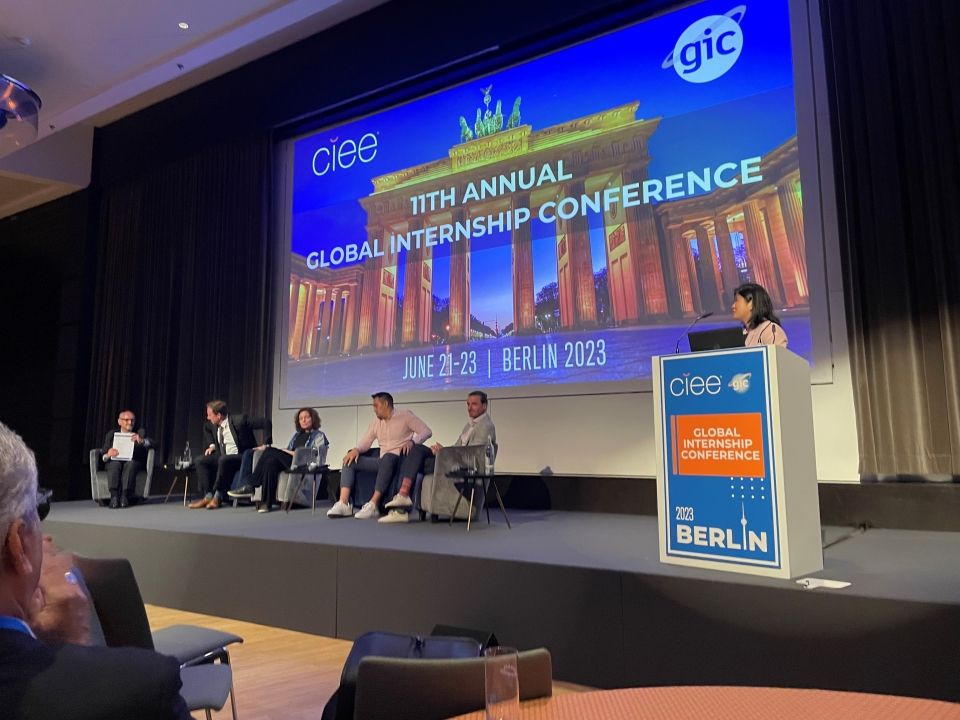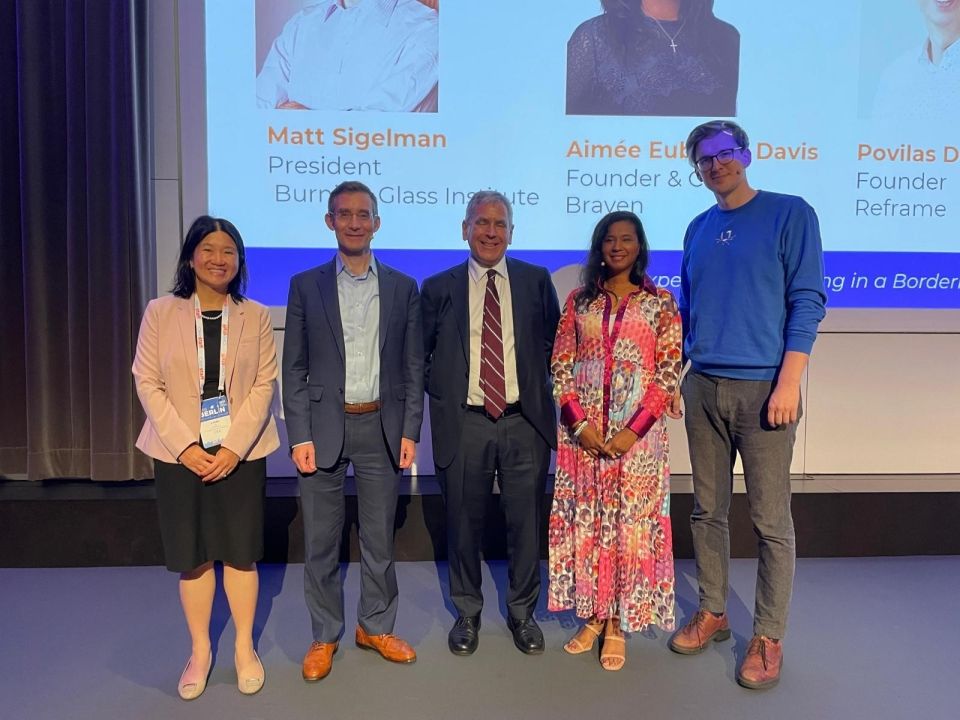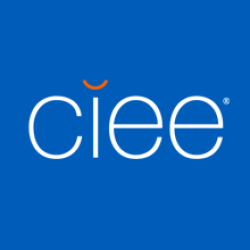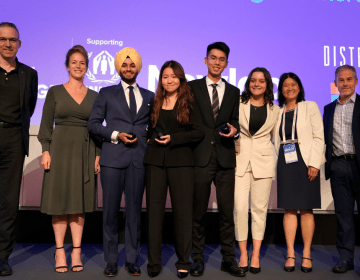Global Internship Conference – Day 1
Today was the first day of the 11th Annual CIEE Global Internship Conference in Berlin, Germany on the theme Global Experiential Learning in a Borderless World.
Hundreds of thought leaders from around the globe, including university leaders and administrators, global education advocates and practitioners, policy makers, industry partners, and students convened to discuss the future of work and global experiential learning that prepares students for global careers.
This morning delegates visited Factory Berlin at Görlitzer Park, a co-working space which is representative of the type of space in which interns in Berlin might work. Visitors heard from industry partners about their organizations, the vibrant startup culture in the city, and the exciting projects on which CIEE interns in Berlin might have an opportunity to work.

At the opening plenary, moderator Francisco Marmolejo engaged an impressive group of global leaders in an energizing discussion of the post-pandemic world of work, the role of employers, universities, and governments in nurturing the next generation of global talent, and the implications for global experiential learning. The panelists were:
- Francisco Marmolejo, Higher Education President, Qatar Foundation (Moderator)
- Mark Howard, Acting Deputy Assistant Secretary for Private Exchange Program Administration at the U.S. Department of State’s Education and Cultural Affairs Bureau
- Dr. Connie Yowell, Senior Vice Chancellor, Education Innovation, Northeastern University
- Marco Dondi, Head of Future Skills Research, McKinsey & Company
- Miguel Encarnacion, Managing Partner, Unifier Ventures
The discussion, led by moderator Francisco Marmolejo, was thought-provoking, offering insights about the benefits of international internships from the perspective of educators, employers, and diplomats. "The diversity of the panel reflects the dimensions of this topic," said Marmolejo.
Universities can help young people foster four important skillsets: cognitive, interpersonal, self-leadership, and digital skills, explained Marco Dondi of McKinsey & Company who highlighted the importance of coaching and feedback.
And there is a great demand in higher education institutions for work-embedded learning that prepares students to successfully enter the workplace, said Dr. Connie Yowell of Northeastern University. "Higher education institutions are designed for stasis, but we are in a time of rapid change," she said.
International internships do not just benefit the individuals participants, but also add value to the workplace, according to Mark Howard from the U.S. Department of State's Education and Cultural Affairs Bureau. Global internships help young people bring a global perspective and diverse thought to the workplace, he said. The benefit of this being "innovation — as innovation does not happen in a static environment."
Miguel Encarnacion, Managing Partner, Unifier Ventures, reflected on his experience coming from the Philippines and how students are "very young and very hungry for technology." Miguel encourages students to “show me experiments you have designed. Show me experiences where you have taken a risk and put yourself out there."

The afternoon featured GIC talks, modeled after Ted-Talks, that will serve as key inspiration for discussions and debates throughout the conference and beyond. Ben Wildavsky, Visiting Scholar, University of Virginia was moderator and this much-anticipated session delivered!
Two leading voices on the education to work transition, Matt Sigelman, President of The Burning Glass Institute, and Aimée Eubanks Davis, Founder and CEO of Braven, focused their GIC talk on simple, but thought-provoking ideas. Work-integrated learning, when intentionally placed within a program designed to support career readiness, has the power to support degree attainment, develop skills, and manufacture social capital, the trifecta for helping young people transition into meaningful careers that change the trajectory of their lives.
"Work is evolving in profound ways," said Sigelman, explaining that jobs increasingly require new skills from across domains which presents a challenge to existing training structures and makes it hard for workers to learn as they go.
“It’s not just who you know, it’s who knows you,” asserted Aimée Eubanks Davis, explaining how social capital can be manufactured through intentional focus on career networks during the teaching and learning process. She spoke about how social capital can help turn degrees into promising careers, especially for students without inherited advantages.
In his GIC Talk, Povilas Dabrila, a former intern with Skanska through the BridgeUSA (J1 visa) program entertained the audience with his personal journey of wondering and wandering. His internship experience in the United States, sponsored by CIEE and funded by the Baltic-American Freedom Foundation, not only helped him launch his own career, it prepared him to establish his own company upon his return home to Lithuania, contributing to jobs and economic development in his local community.
The afternoon featured three concurrent breakout sessions.
Flexibility vs. Face-Time: The Future of Work and Learning, a panel discussion focused on the emerging tension between employers wanting their staff to return to offices and employees valuing the flexibility of being able to work and live anywhere. It addressed the role and value of remote experiences, such as virtual internships, in developing early career talent.
Immigration Policy: Don’t give up, it’s not always a hindrance to talent circulation, a panel discussion of ways to use existing policies and tools for early career, training to hire, and intern employment opportunities to overcome the barriers immigration policy can present for global talent mobility. Panelists discussed the opportunities that can be created for specialized talent in areas like STEM, but also overlooked talent like refugees.
New models for building inclusive global work-integrated learning programs, a panel discussion of the many facets of inclusion and diversity, and the importance of ensuring that experiential learning programs are intentionally built to serve all students.
Then in the evening, delegates took a virtual trip around the world at the Meet CIEE welcome reception at the CIEE Berlin Center. CIEE center directors from 40 global locations were present to discuss with attendees the programs and experiences students can enjoy in their cities.
Throughout the CIEE Global Internship Conference, you can follow along on social media. Experiences and highlights will be shared using the hashtags #GICBerlin23, #CIEEGICBerlin, #CIEEInternationalInternships, and #CIEEStudyAbroadInternships.
Related Posts
University of Southern California Team Wins GIC UNHCR Student Challenge at the 11th Annual CIEE Global Internship Conference in Berlin
Last week, three university student teams traveled to the 11 th Annual CIEE Global Internship Conference (GIC) in Berlin, Germany for the finals of the inaugural GIC UNHCR Student Challenge... keep reading
CIEE Alumni to Attend Obama Town Hall in Berlin
Seven CIEE Exchange Program alumni were chosen to attend an Obama Town Hall in Berlin, where President Barack Obama will engage young people from across Europe in discussions about the... keep reading
CIEE REINVENTS STUDY ABROAD WITH DEBUT OF GLOBAL INSTITUTE IN BERLIN
Today CIEE: Council on International Educational Exchange welcomed 111 students from more than 80 U.S. colleges and universities to its new Global Institute in Berlin, Germany. A 100-year-old former manufacturing... keep reading







